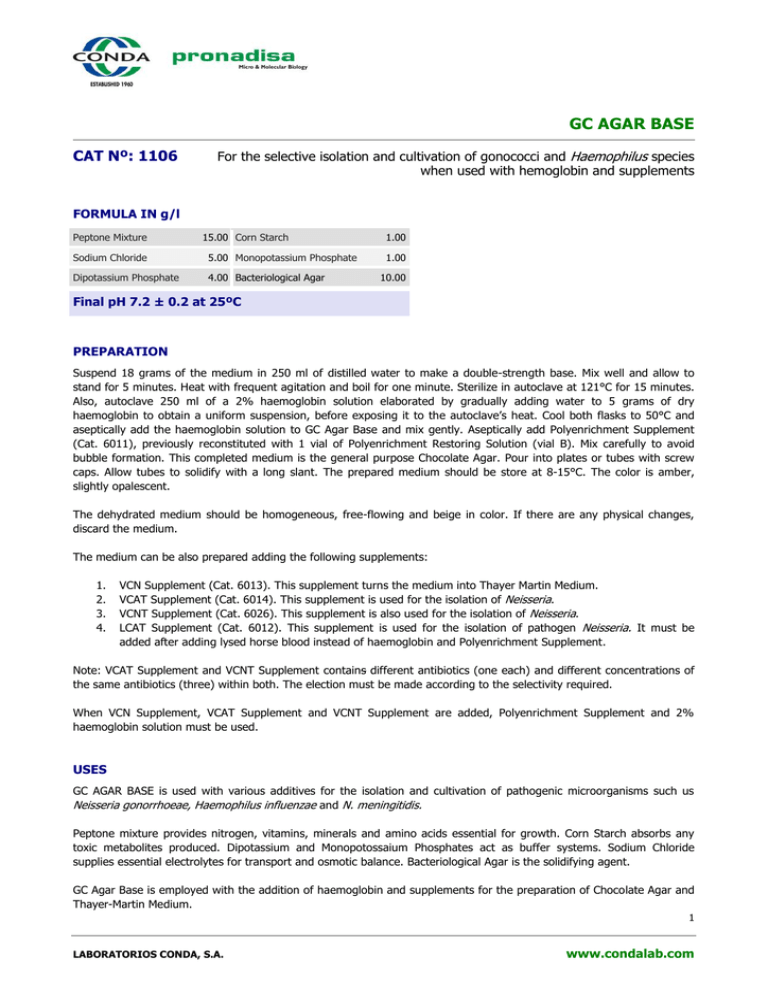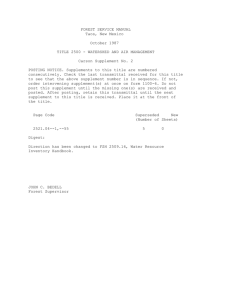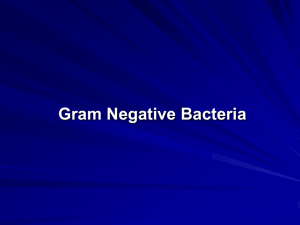GC AGAR BASE CAT Nº: 1106 Haemophilus
advertisement

GC AGAR BASE CAT Nº: 1106 For the selective isolation and cultivation of gonococci and Haemophilus species when used with hemoglobin and supplements FORMULA IN g/l Peptone Mixture 15.00 Corn Starch Sodium Chloride 5.00 Monopotassium Phosphate Dipotassium Phosphate 4.00 Bacteriological Agar 1.00 1.00 10.00 Final pH 7.2 ± 0.2 at 25ºC PREPARATION Suspend 18 grams of the medium in 250 ml of distilled water to make a double-strength base. Mix well and allow to stand for 5 minutes. Heat with frequent agitation and boil for one minute. Sterilize in autoclave at 121°C for 15 minutes. Also, autoclave 250 ml of a 2% haemoglobin solution elaborated by gradually adding water to 5 grams of dry haemoglobin to obtain a uniform suspension, before exposing it to the autoclave’s heat. Cool both flasks to 50°C and aseptically add the haemoglobin solution to GC Agar Base and mix gently. Aseptically add Polyenrichment Supplement (Cat. 6011), previously reconstituted with 1 vial of Polyenrichment Restoring Solution (vial B). Mix carefully to avoid bubble formation. This completed medium is the general purpose Chocolate Agar. Pour into plates or tubes with screw caps. Allow tubes to solidify with a long slant. The prepared medium should be store at 8-15°C. The color is amber, slightly opalescent. The dehydrated medium should be homogeneous, free-flowing and beige in color. If there are any physical changes, discard the medium. The medium can be also prepared adding the following supplements: 1. 2. 3. 4. VCN Supplement (Cat. 6013). This supplement turns the medium into Thayer Martin Medium. VCAT Supplement (Cat. 6014). This supplement is used for the isolation of Neisseria. VCNT Supplement (Cat. 6026). This supplement is also used for the isolation of Neisseria. LCAT Supplement (Cat. 6012). This supplement is used for the isolation of pathogen Neisseria. It must be added after adding lysed horse blood instead of haemoglobin and Polyenrichment Supplement. Note: VCAT Supplement and VCNT Supplement contains different antibiotics (one each) and different concentrations of the same antibiotics (three) within both. The election must be made according to the selectivity required. When VCN Supplement, VCAT Supplement and VCNT Supplement are added, Polyenrichment Supplement and 2% haemoglobin solution must be used. USES GC AGAR BASE is used with various additives for the isolation and cultivation of pathogenic microorganisms such us Neisseria gonorrhoeae, Haemophilus influenzae and N. meningitidis. Peptone mixture provides nitrogen, vitamins, minerals and amino acids essential for growth. Corn Starch absorbs any toxic metabolites produced. Dipotassium and Monopotossaium Phosphates act as buffer systems. Sodium Chloride supplies essential electrolytes for transport and osmotic balance. Bacteriological Agar is the solidifying agent. GC Agar Base is employed with the addition of haemoglobin and supplements for the preparation of Chocolate Agar and Thayer-Martin Medium. 1 LABORATORIOS CONDA, S.A. www.condalab.com Chocolate Agar is prepared with the addition of 2% haemoglobin. The addition of Haemoglobin provides hemin (X factor), required by Haemophilus species and promotes the growth of Neisseria species. A chemical enrichment composed of cofactors, vitamins and nicotinamide adenine dinucleotide (NAD) is also required for the growth of Haemophilus and Neisseria spp. If required, antimicrobial supplements are added as inhibitors for an improved selectivity of the medium. Thayer-Martin Medium is recommended for the primary isolation of N. gonorrhoeae and N. meningitidis from specimens with mixed flora taken from throat, vagina, rectum and urethra samples. It is designed to reduce the overgrowth of gonococci and meningococci by contaminants, to suppress saprophytic Neisseria species growth and to encourage pathogenic Neisseria growth. The typical colonies of N. gonorrhoeae on Thayer-Martin Medium are white-gray, opaque, sometimes shiny, finely granular in appearance, variable in size (1 - 2 mm), round with entire or lobate edges and mucoid after 48 hours of incubation. The specimen should be placed on the surface of the plate making sure that a heavy inoculum is contained in a relatively small area. Streaking out from this area will produce well-isolated colonies. Incubate in a humid atmosphere of 5 - 10% CO2 and at 35°C for 40 - 48 hours. For suspect isolated colonies, perform a Gram stain and oxidase test. In carbohydrate studies using the CTA Medium (Cat. 1502) with selected 1% sugars, N. gonorrhoeae ferments only glucose with acid production but no gas production. N. meningitidis ferments both glucose and maltose with acid but no gas production. The carbohydrate tests are carried out incubating the medium for 1 - 4 days at 35°C, aerobically and without CO2. The antimicrobial agents in selective formulas such as Thayer-Martin Medium inhibit some strains of N. gonorrhoeae, therefore it is wise to streak non-selective Chocolate Agar plates to culture these organisms. MICROBIOLOGICAL TEST The following results were obtained from type cultures in the performance of the medium, with Polyenrichment Supplement (Cat. 6011) and haemoglobin added, after incubation at a temperature of 35 ± 2°C, under 5 - 10% CO2 atmosphere and observed after 40 - 48 hours. Microorganisms Haemophilus influenzae ATTC 19418 Neisseria meningitidis ATCC 13090 Neisseria gonorrhoeae ATCC 19424 Streptococcus pneumoniae ATCC 6303 Streptococcus pyogenes ATCC 19615 Growth Good Good Good Good Good BIBLIOGRAPHY Bailey and Scott. Diagnostic Microbiology. Fifth Edition, 1978. The C.V. Mosby Company. St. Louis, USA. Preparation of Transgrow. Sept. 15. 1971. Venereal Disease Research Lab., C.D.C. Atlanta, Ga., USA. Thayer, J. D. Martin J. E., 1966. Improved medium selective for the cultivation of N. gonorrhoeae and N. meningtidis. Public Health Rep. 81. 559-562. STORAGE 25ºC Once opened keep powdered medium closed to avoid hydration. 2ºC 2 LABORATORIOS CONDA, S.A. www.condalab.com

